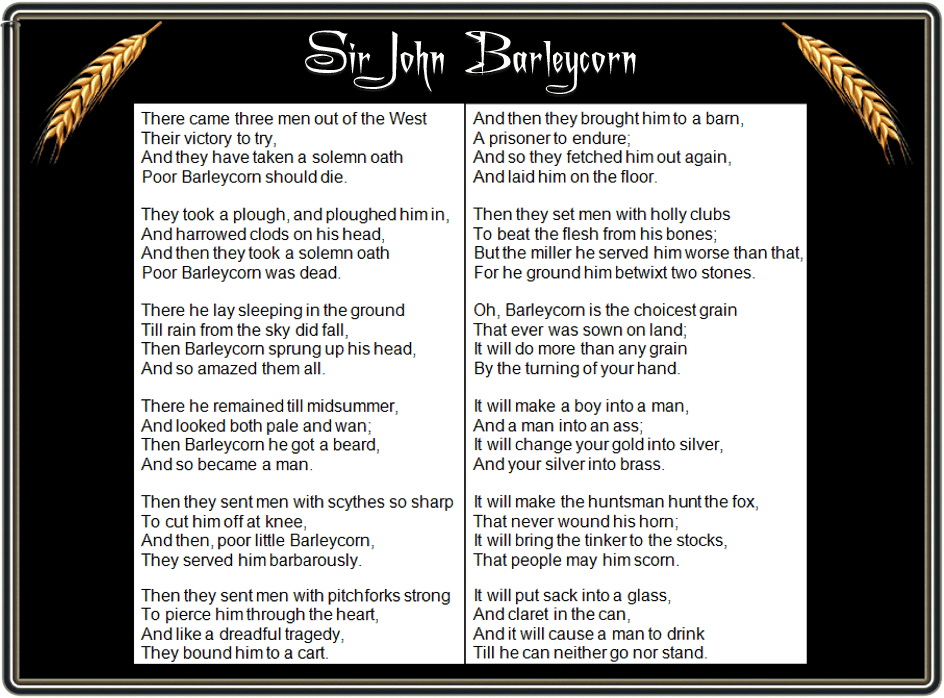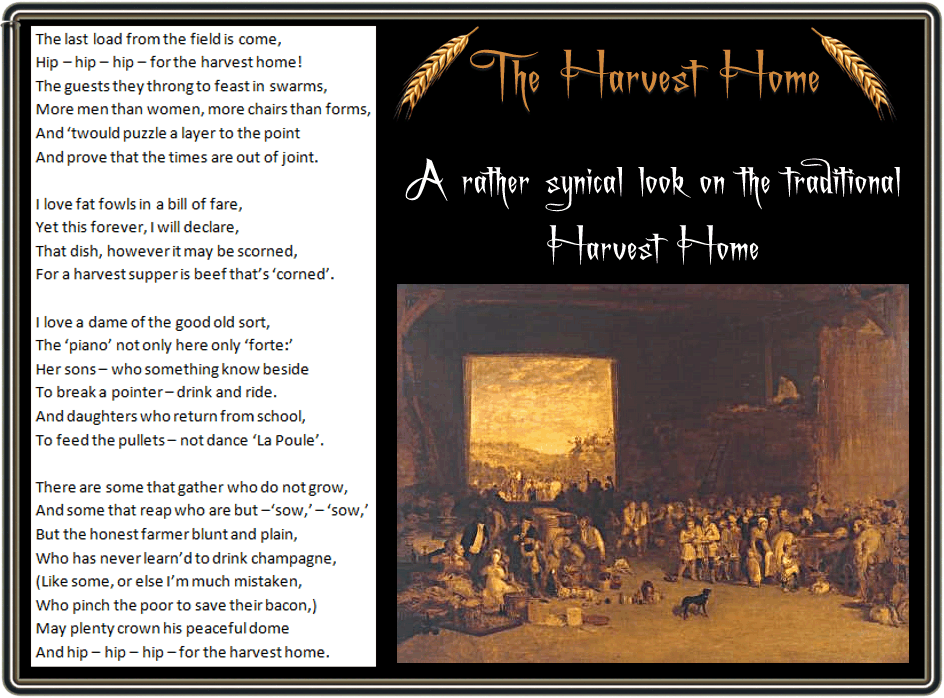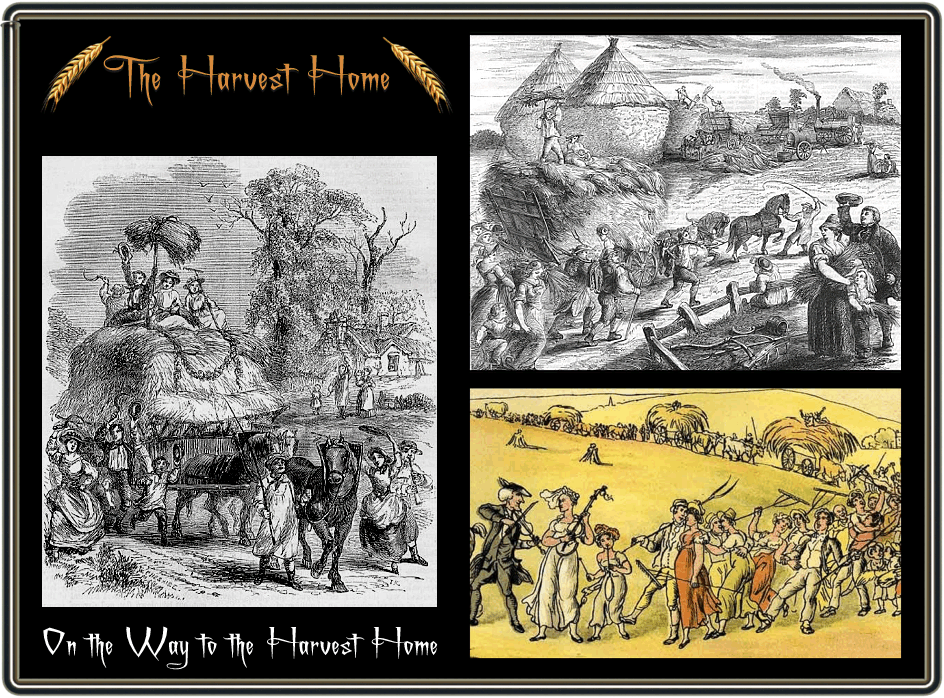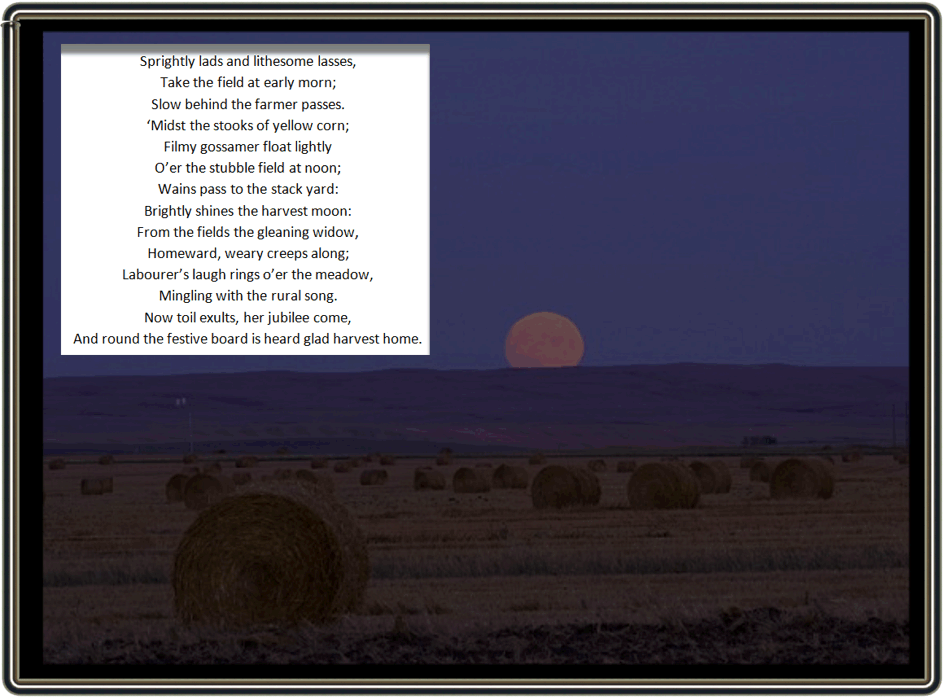
At one time the annual ‘Harvest Home’ was very much a celebration between local farmers, their workers and neighbours but today, where the tradition is carried on, it has expanded to a community affair in the village or town and anyone who wants to can attend. Below is a brief description of a typical moorland Harvest Home from 1838:
“There are boys in almost every tree by which the wain passes, looking down upon the last load, and shouting with all their might – then descending, and joining the ‘rain’ before of behind, and keeping up the cheerful sound of ‘Harvest Home.’ Now they near the large good-looking farmhouse; see, the old farmer is at his gate with a foaming tankard in his hand! His wife, too, is beside him; and his handsome daughter hath taken off her round gypsy hat, – hark, how her clear voice rings! There is a youth, too, beside her, – it is the young squire: he has also come to share in the merriment of ‘Harvest Home.’ But listen! for they have halted beside the gate which opens to the front of the house and are singing a stave nearly as old as the hills.
Summer’s toiling now is past: – Harvest now hath sent her last – Her last, last load. – If the field containeth more, – Master, give it to the poor! – Abroad – abroad, – Let them through the cornfield roam, – While we welcome harvest home – Harvest Home, harvest home: – Songs shall sound and ale cups foam – While we welcome harvest home.
And see! others have emerged from the stack-yard, in their clean white frocks, their faces ruddy with toil and health; and now they take their seats under the old oak tree, where a substantial dinner is smoking. At each end of the table are seats covered with green branches – those are for the lord and lady of the harvest. But even the peasants are courteous, and have resigned them to the young squire and the farmer’s daughter, who they expect will one day be their master and mistress. And now the old man is carving the large sirloin, and the good wife is busied attending to their wants: neither of them will eat a mouthful until the others are supplied. What platefuls they devour! Look at those enormous plum puddings, at first loads for an atlas. What inroads they made upon the thick rotundity of a world of sweet! and how happy they all appear.” – The Exeter & Plymouth Gazette, August 18th, 1838.
The traditional Dartmoor ‘Harvest Home’ began once the age-old custom of ‘Crying the Neck‘ had been performed and the last wagon of corn was brought back to the farm. The farmer, or more precisely the farmer’s wife, would then lay on in most cases a sumptuous feast for all concerned with his harvest. For the farmer or landowner it was a celebration of a successful harvest and the profits it would hopefully bring. For those whose actually harvested the crop it was a celebration of a job well done and a brief respite from the hard labour involved as well as an opportunity for a free feast and in most Dartmoor cases a good old piss-up.
The food which was laid on would differ from farm to farm but the more common items would be beef, pork, sides of bacon all served with a selection of vegetables. Following the main course would come a variety of local puddings such as; Viggy Pudden or Junket, both accompanied with lashings of farmhouse cream. Once the plates had been cleared the proceedings would have probably been clouded with the smoke from numerous clay pipes, their smokers quietly letting their food settle before the next stage of the proceedings. The cider or beer would continue to flow and there would be various toasts made, mainly in thanks for a successful harvest and to the ‘Master’ for his hospitality. The famous Dartmoor author, Robert Herrick wrote of such a one: “Which freely drink to your lord’s health – Then to the plough, the commonwealth; – Next to your flails, your fanes, your vats; – Then to the maids with wheaten hats: – To the rough sickle, and crookt scythe, – Drink, frolic boys, till all be blythe.” – The Hock Cart or Harvest Home. Another example being; “Come sons of summer, by whose toil – We are the lords of wine and oile; – By whose tough labours and rough hands – We rip up first the plow the lands, – Crowned with the cares of corne, now come, – And, to the pipe, sing Harvest Home!”
Mrs Eliza Bray describes a Dartmoor Harvest Home thus: “In the evening of Harvest Home the supper takes place in the barn, or some other suitable place, the master and mistress generally presiding. This feast is always composed of substantial viands, with and abundance of good ale, and human nature insures that it should be a scene of intense enjoyment. Someone, with better voice than his neighbours, leads of a song of thanks to the host and hostess, in something like the following strain:
Here’s a health to out master,
The lord of the feast;
God bless his endeavours,
And send him increase.
May prosper his crops, boys,
And we reap next year;
Here’s our master’s good health, boys,
Come drink of your beer!
Now harvest is ended,
And supper is past;
Here’s our mistress’s health, boys,
Come drink a full glass.
For she’s a good woman,
Provides us good cheer;
Here’s your mistress’s good health, boys,
Come drink off your beer!
One of the rustic assemblage, being chosen to act as ‘lord,’ goes out, puts on a sort of disguise, and come in again, crying in a prolonged note, Lar-gess! He and some companions then go about with a plate among the company and collect a little money with a view to further regalements at the village ale-house. With these, protracted, usually to a late hour, the harvest feats ends.”
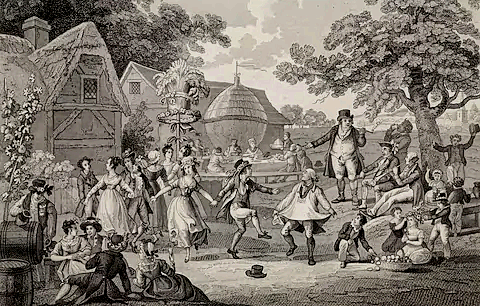
Once the feast and the toasts were done it was time for the singing of traditional harvest songs and dancing. One of the popular songs was the ‘Barley Mow’ which on these occasions was very fitting and did more than encourage the cider and beer to flow even more. It is a lengthy song but the first verse went; “Good luck to the Barley Mow – Now here’s jolly good luck to the quarter gill, – Good luck to the Barley Mow. – Jolly good luck to the quarter gill, – Good luck to the Barley Mow. – Oh, the quarter gill – Fetch in a little drop moor, – Good luck to the Barley Mow.” In the remaining verses the words; half pint, pint pot, quart pot, half gallon, gallon, half bushel, bushel, half barrel, barrel, bar maid, land lady, land lord, brewery, and company would in turn replace the words quarter gill.
As noted above, the individual Harvest Homes began to become slightly less common and in 1835 the following report appeared in a local newspaper; “The gradual demise of the harvest-home festivities, we have always viewed with regret. Changes in manners, and the separation of the feelings and habits of the farmer from those of the peasant, operated by huge farms, have unavoidably annihilated the social reunions that a century ago were the most joyous of rural amusements. Still we consider it as a misfortune: it linked together the kindly feelings of the parties, and placed them in a position, with regard to each other, favourable for charitable communion. They are however, gone, and are unfortunately irreclaimable.” One of the influencing factors due to the decline of Harvest Homes, even on Dartmoor was the coming of farm mechanisation. As the years passed and the machinery became even more efficient there was a rapid decline in the numbers employed on the farms. Then there was the move from working the land to industrial jobs in the nearby towns and cities which paid much higher wages which again saw reduced agricultural employees. Then came the two World Wars which to a certain extent influenced the old traditions.
 Legendary Dartmoor The many aspects past and present of Dartmoor
Legendary Dartmoor The many aspects past and present of Dartmoor

